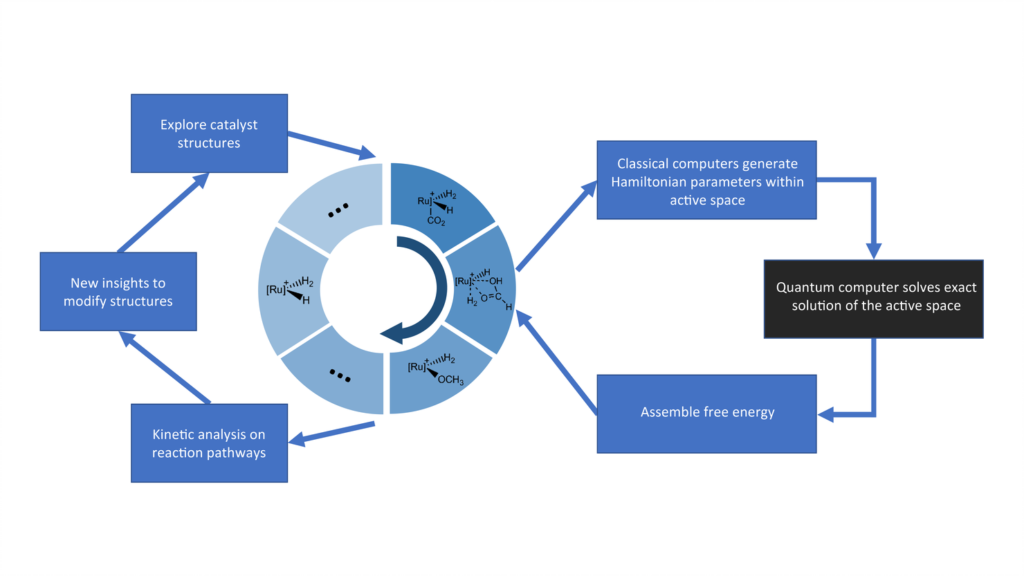Quantum Computing
Quantum computing is a rapidly developing field of technology that has the potential to revolutionize the way we process and store data. Unlike classical computers, which use bits to represent and process information, quantum computers use quantum bits, or qubits, which can exist in multiple states simultaneously. This ability to exist in multiple states, known as superposition, allows quantum computers to perform certain calculations much faster and more efficiently than classical computers.
The concept of quantum computing was first proposed in the 1980s, but it wasn’t until the late 1990s and early 2000s that scientists began to build and test basic quantum computing systems. Since then, the field of quantum computing has grown rapidly, with a number of companies, research institutions, and governments investing significant resources into the development of this technology.

One of the key advantages of quantum computing is its ability to perform certain calculations much faster than classical computers. This is due to the ability of qubits to exist in multiple states simultaneously, which allows quantum computers to perform certain operations in parallel. This makes quantum computers particularly well suited for tasks such as factorization, which is the process of breaking down a large number into its prime factors. This is an important task in cryptography and is used to secure internet transactions and communication.
Another advantage of quantum computing is its ability to handle large amounts of data. This is due to the ability of qubits to exist in multiple states simultaneously, which allows quantum computers to store and process large amounts of data in a single operation. This makes quantum computers particularly well suited for tasks such as machine learning and data analysis.
Despite the many advantages of quantum computing, there are also a number of challenges that need to be overcome before this technology can be widely adopted. One of the main challenges is the issue of noise and decoherence. Noise and decoherence refer to the unwanted interactions between the qubits and the environment that can cause errors in the computation. Scientists are currently working on developing error-correcting codes and other techniques to mitigate the effects of noise and decoherence.
Another challenge is the issue of scalability. The current generation of quantum computers is limited in the number of qubits they can handle. In order for quantum computing to be widely adopted, scientists need to develop scalable systems that can handle large numbers of qubits.
Finally, there is the issue of programming and software development for quantum computers. Unlike classical computers, which use traditional programming languages, quantum computers require specialized programming languages and algorithms.
History
The history of quantum computing can be traced back to the early 1900s with the development of quantum mechanics, a branch of physics that deals with the behavior of particles at a subatomic level. In the 1980s, physicist Richard Feynman proposed the idea of using quantum mechanics to perform computations, which laid the foundation for the field of quantum computing.
In the late 1980s and early 1990s, researchers at the Los Alamos National Laboratory and the Massachusetts Institute of Technology (MIT) began experimenting with the idea of using quantum mechanics to perform calculations. They developed the first basic quantum algorithms and proposed the use of quantum bits or qubits, which could exist in multiple states simultaneously, unlike classical bits.
In the mid-1990s, researchers at the University of California, Berkeley, and the IBM Almaden Research Center successfully demonstrated the first basic quantum gate, which is a fundamental building block of a quantum computer. This was followed by the development of the first basic quantum error-correcting codes and the first basic quantum algorithms.
In the early 2000s, scientists at the University of California, Berkeley, and the IBM Almaden Research Center successfully built and tested the first basic quantum computer, which was able to perform certain calculations much faster than classical computers. This was a significant milestone in the development of quantum computing and demonstrated the potential of this technology.

Since then, the field of quantum computing has grown rapidly, with a number of companies, research institutions, and governments investing significant resources into the development of this technology. In recent years, there has been significant progress in the development of scalable quantum systems, error-correcting codes, and quantum algorithms.
In 2016, Google announced that their quantum computer, named Sycamore, had achieved quantum supremacy, meaning it could perform a specific task faster than any classical computer. This was a major breakthrough in the field of quantum computing, and since then many other companies have also announced their progress in the field of quantum computing.
How Quantum Computing works
Quantum computing is based on the principles of quantum mechanics, which is a branch of physics that deals with the behavior of particles at a subatomic level. Unlike classical computers, which use bits to represent and process information, quantum computers use quantum bits, or qubits, which can exist in multiple states simultaneously. This ability to exist in multiple states, known as superposition, allows quantum computers to perform certain calculations much faster and more efficiently than classical computers.
The basic building block of a quantum computer is the qubit. A qubit can exist in a state of 0 or 1, like a classical bit, but it can also exist in a state known as superposition, where it can be in a state of 0 and 1 simultaneously. This allows a qubit to perform multiple calculations at the same time.
Another key feature of quantum computing is entanglement. Entanglement is a phenomenon where two or more qubits become connected in such a way that the state of one qubit is dependent on the state of the other. This allows quantum computers to perform certain calculations much faster than classical computers.
Quantum gates are used to manipulate the state of qubits. A quantum gate is a unitary operation that can be applied to a qubit, similar to how a classical gate can be applied to a bit. Quantum gates can be used to perform basic operations such as NOT, AND, and OR.
Quantum algorithms are used to perform specific calculations on a quantum computer. A quantum algorithm is a set of instructions that tells a quantum computer what operations to perform on the qubits. Some examples of quantum algorithms include Shor’s algorithm, which can be used to factor large numbers and Grover’s algorithm, which can be used to search large databases.
To perform a calculation on a quantum computer, qubits are initialized to a specific state and quantum gates are applied to manipulate their state. The final state of the qubits is then measured to obtain the result of the calculation.
Overall, quantum computing works by using qubits that can exist in multiple states simultaneously, which allows quantum computers to perform certain calculations much faster and more efficiently than classical computers. The basic building blocks of a quantum computer are qubits, quantum gates, and quantum algorithms. By manipulating the state of qubits with quantum gates and performing calculations with quantum algorithms, a quantum computer can perform certain tasks much faster than classical computers.

Types of quantum computing
There are several different types of quantum computing, each with its own set of advantages and disadvantages. Some of the main types of quantum computing include:
- Gate-based quantum computing: This is the most common type of quantum computing and is based on the use of quantum gates to manipulate the state of qubits. Gate-based quantum computing is considered to be the most mature technology and is the most similar to classical computing.
- Annealing-based quantum computing: This type of quantum computing is based on the use of quantum annealing, a process that allows the qubits to be slowly cooled to their ground state, where they are less likely to experience errors. Annealing-based quantum computing is well suited for optimization problems, such as the traveling salesman problem.
- Topological quantum computing: This type of quantum computing is based on the use of topological qubits, which are more stable and less prone to errors than traditional qubits. Topological quantum computing is considered to be a promising technology for building large-scale quantum computers.
- Adiabatic quantum computing: This type of quantum computing is based on the use of adiabatic evolution, a process that allows the qubits to be slowly evolved to a final state, where they are less likely to experience errors. Adiabatic quantum computing is well suited for optimization problems, such as the traveling salesman problem.
- Measurement-based quantum computing: This type of quantum computing is based on the use of measurements to manipulate the state of qubits. Measurement-based quantum computing is considered to be a promising technology for building large-scale quantum computers.
- Photonic quantum computing: This type of quantum computing uses light as the medium to carry qubits and is considered to be a promising technology for building large-scale quantum computers, as well as for communication purposes.
- Ion-trap quantum computing: This type of quantum computing uses ions as qubits and is considered to be a promising technology for building large-scale quantum computers due to its high-fidelity qubits.
- Superconducting quantum computing: This type of quantum computing uses superconducting qubits which operates at low temperatures, it is considered to be a promising technology for building large-scale quantum computers.
Application of Quantum Computing
Quantum computing has the potential to revolutionize a wide range of industries and applications, some of the main applications include:
- Cryptography: Quantum computers can perform certain calculations much faster than classical computers, such as factoring large numbers. This makes them well-suited for breaking encryption algorithms that are currently used to secure internet transactions and communication.
- Drug Discovery: Quantum computing can help in simulating complex chemical and biological systems, which can aid in the discovery of new drugs, by providing a more accurate understanding of how molecules interact.
- Supply Chain Optimization: Quantum computing can help optimize the supply chain, from production to delivery, by simulating different scenarios and identifying the most efficient options.
- Machine Learning: Quantum computing can help improve the performance of machine learning algorithms, by allowing them to process and analyze large amounts of data more efficiently.
- Financial Modeling: Quantum computing can help improve the performance of financial modeling, by allowing for more accurate simulations of market conditions and risk assessments.
- Weather forecasting: Quantum computing can help improve the performance of weather forecasting, by allowing for more accurate simulations of atmospheric conditions and weather patterns.
- Traffic Optimization: Quantum computing can help optimize traffic flow in cities, by simulating different traffic scenarios and identifying the most efficient options.
- Image and Video processing: Quantum computing can help improve the performance of image and video processing, by allowing for more efficient compression and analysis of large amounts of data.
- Logistics and transportation: Quantum computing can help optimize logistics and transportation, by simulating different transportation scenarios and identifying the most efficient options.
- Cybersecurity: Quantum computing can help improve cybersecurity, by simulating different cyber-attack scenarios and identifying vulnerabilities in network security.
Overall, there are many potential applications of quantum computing, from cryptography and drug discovery to traffic optimization and cybersecurity. As the technology continues to develop, the potential for quantum computing to revolutionize various industries and improve people’s lives in various ways is significant.
Advantages
Quantum computing has a number of advantages over classical computing, which include:
- Speed: Quantum computers can perform certain calculations much faster than classical computers, making them well-suited for tasks such as factoring large numbers, which is an important task in cryptography.
- Parallel processing: Quantum computers can perform certain operations in parallel, which allows them to process and analyze large amounts of data much faster than classical computers.
- Large data handling: Quantum computers can handle large amounts of data, which makes them well-suited for tasks such as machine learning and data analysis.
- Optimization: Quantum computers can help optimize complex systems, such as supply chains, traffic flow, and logistics, by simulating different scenarios and identifying the most efficient options.
- Drug Discovery: Quantum computing can help in simulating complex chemical and biological systems, which can aid in the discovery of new drugs.
- Improving weather forecasting: Quantum computing can help improve the performance of weather forecasting, by allowing for more accurate simulations of atmospheric conditions and weather patterns.
- Improving image and video processing: Quantum computing can help improve the performance of image and video processing, by allowing for more efficient compression and analysis of large amounts of data.
- Improving cybersecurity: Quantum computing can help improve cybersecurity, by simulating different cyber-attack scenarios and identifying vulnerabilities in network security.
- Improved Machine learning: Quantum computing can help improve the performance of machine learning algorithms, by allowing them to process and analyze large amounts of data more efficiently.
- Financial modeling: Quantum computing can help improve the performance of financial modeling, by allowing for more accurate simulations of market conditions and risk assessments.
Disadvantages
While quantum computing has many potential advantages, there are also several limitations and disadvantages that need to be considered:
- Noise and decoherence: One of the main limitations of quantum computing is the issue of noise and decoherence, which refer to the unwanted interactions between the qubits and the environment that can cause errors in the computation. This noise and decoherence can be mitigated by using error-correcting codes, but it still remains a significant challenge.
- Scalability: Another limitation of quantum computing is scalability, as the current generation of quantum computers is limited in the number of qubits they can handle, making it difficult to build large-scale quantum computers.
- Temperature: Quantum computing requires extremely low temperatures to operate which makes it difficult to build and maintain.
- Programming and software development: Unlike classical computers, which use traditional programming languages, quantum computers require specialized programming languages and algorithms, which can make them difficult to program and use.
- Power consumption: Quantum computers require a significant amount of power to operate, which can make them expensive to run.
- Cost: Quantum computers are currently very expensive to build and maintain.
- Limited availability: Quantum computing is still in its early stages of development and has limited availability, not many companies or institutions have access to quantum computers.
- Limited use cases: Currently, quantum computing is not well-suited for all types of computations and its application is limited to specific use cases.
Quantum computing in India
India has been actively investing in the development of quantum computing in recent years. The Indian government has recognized the potential of this technology and has been working to establish research and development centers, and collaborations with international partners to further advance the field.
The Indian government has set up the National Quantum Computing Centre (NQCC) at the Indian Institute of Science (IISc) in Bangalore, which is the country’s first research center dedicated to the development of quantum computing. The center will focus on the development of quantum algorithms, quantum communication, and quantum cryptography.
In addition to this, the government also set up the National Quantum Communications Centre (NQCC) at the Harish-Chandra Research Institute (HRI) in Allahabad. The center will focus on the development of quantum communication technology and infrastructure.
The Department of Science and Technology (DST) has also launched several initiatives to promote the development of quantum computing in India. The DST has set up the National Mission on Quantum Technologies and Applications (NM-QTA) to support research and development in the field of quantum computing.
Several Indian universities and institutions have also been working on quantum computing research, such as the Indian Institute of Technology (IIT) Delhi, the Indian Institute of Technology (IIT) Bombay and the Indian Institute of Technology (IIT) Kanpur.
The private sector in India is also investing in the development of quantum computing, with companies such as Tata Consultancy Services, Wipro, and Infosys, investing in research and development in the field.
Overall, India has been actively investing in the development of quantum computing in recent years. The Indian government has set up dedicated research centers and initiatives to promote the development of quantum computing. Indian universities, institutions, and private sector companies have also been investing in research and development in the field. With this support, India has the potential to become a key player in the global quantum computing industry.
Conclusion
In conclusion, quantum computing is a rapidly advancing technology that has the potential to revolutionize many industries and improve people’s lives in various ways. Quantum computing is based on the principles of quantum mechanics and utilizes qubits, which can exist in multiple states simultaneously, in contrast to classical bits. The speed and parallel processing capabilities of quantum computers make them well-suited for tasks such as factoring large numbers, simulating complex systems, and optimizing complex systems.
However, there are also several limitations and disadvantages of quantum computing that need to be considered, such as noise and decoherence, scalability, temperature, programming and software development, power consumption, cost and limited availability. Additionally, the field is still in its early stages and the technology is not yet mature enough to be widely adopted, making it challenging to develop and implement quantum computing solutions.
Despite these limitations, the potential benefits of quantum computing are significant, and many countries including India are actively investing in the development of quantum computing. With continued research and development, it is likely that many of the limitations of quantum computing will be overcome, and the technology will become more widely adopted in the future.
![]()


